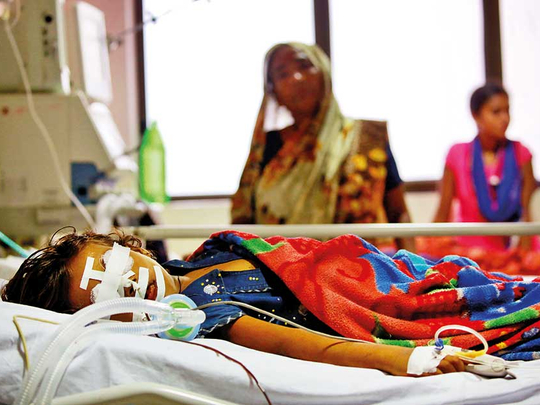
New Delhi: Encephalitis refers to a sudden inflammation of the brain, usually resulting from either a viral infection or due to the body’s own immune system mistakenly attacking brain tissue.
The symptoms include headache, fever, confusion, drowsiness, and fatigue. Further symptoms include seizures or convulsions, tremors, hallucinations, stroke, and memory problems.
The mild cases may cause no symptoms or mild flu-like symptoms. Severe cases, however, can be life-threatening. Immediate medical attention is required for symptoms such as confusion, hallucinations, seizures, weakness and loss of sensation.
“Adult patients with encephalitis show symptoms including acute onset of fever, headache, confusion, and sometimes seizures. Younger children or infants may show irritability, poor appetite and fever. Neurological examinations usually reveal a drowsy or confused patient,” Komal Kushwaha, former head of Paediatrics Department at Gorakhpur District Hospital, told Gulf News.
Mortality depends on a number of factors, including the severity of the disease and age.
“Younger patients tend to recover without many ongoing health issues, whereas older patients are at higher risk for complications and mortality,” adds Dr Kushwaha.
The treatment for encephalitis focuses on alleviating symptoms. There are only a limited number of reliably tested specific antiviral agents that can help. Anticonvulsants are sometimes given to patients who have seizures. Sedatives can be effective for seizures, restlessness, and irritability.
For patients with mild symptoms, the best treatment is rest, plenty of fluids, and Paracetamol for fever and headaches.
Importantly, oxygen is critical to treating life-threatening encephalitis.
“Oxygen helps prevent further deterioration of the brain and helps in the recovery process. Newborn babies with respiratory distress or lung infections or encephalitis will require carefully titrated oxygen delivered through an oxygen hood or ventilator,” Dr Ashok Kumar, Professor of Paediatrics and Neonatology at Banaras Hindu University Institute of Medicine, Uttar Pradesh told Gulf News.
Paediatricians agree that oxygen is very important to prevent long-term brain damage.
“In encephalitis, the brain swelling is associated with what doctors call an increase in intracranial pressure which, if not controlled, can increase the pressure on the brainstem, a region that controls breathing and consciousness. This can reduce the patient’s breathing ability, which means less oxygen can be assimilated from the lungs. This means there is less oxygen in the blood to be transported to the brain. And this could contribute to further brain damage,” says Dr Kushwaha.












